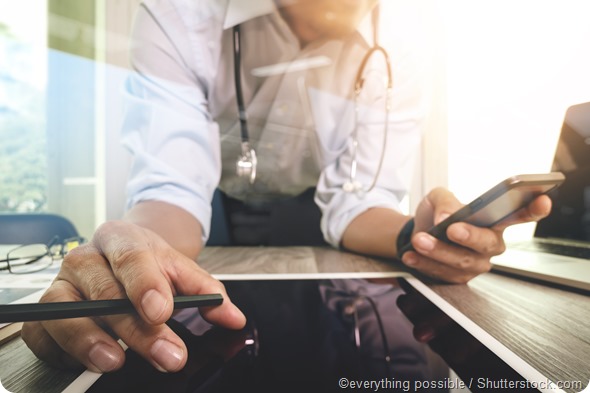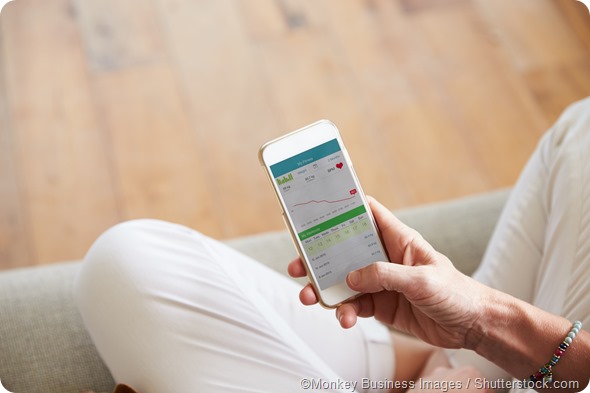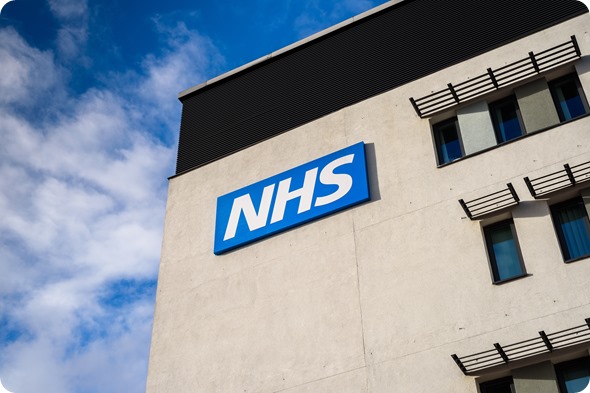As one of Yorkshire’s most successful technology entrepreneurs, why have you decided to invest in digital health?
The NHS is an institution that we’re all going to need at some stage in our lives. As you slowly mature, you realise that you might be needing it more and more. However, everything you read in the news about the NHS is always negative.
I believe that the inspiration for investing in digital health came from people I know who had to go on warfarin. There were three people within about four months who were put on warfarin. For some of them, it was an absolute pain going to the clinic every fortnight, but they didn't have any trouble getting time off work. However, for one particular person, getting time off work was a serious issue and getting to the clinic wasn't easy because they didn't have a car. I started thinking why are people going to clinics and that there must be a better way of doing this.

Technology is the solution. Lots of monitoring goes on within the NHS and, certainly, home monitoring would be of great assistance to a huge number of people. If you do home monitoring, the logical extension of that is that you free up resources in the NHS to deal with functions that are much more in need of qualified people.
To me, this revolution would be exactly the same as the digital revolution. For example, if you asked a sample of people: "how much of your shopping do you do online?", it would certainly be a substantial percentage. On the contrary, if you say to the NHS “how much of your monitoring is done at home?” it's probably zero, or next to zero. There's no adoption of technology in my opinion within the NHS. A lot of that has to actually come down from the leadership. There's no leadership from the top.
I care a lot about the NHS. The NHS is the mainstay in the country for people who are poorly. I think somebody needs to try and do something to give the NHS a break. It's always terminally short of money, short of staff and short of virtually everything, but nobody's actually doing anything constructive, in my opinion, to rectify that apart from saying "oh, we need more money." More money isn't going to solve the inefficiencies because you're just producing more and more inefficiencies.
I'm a great lover of technology that's useful and I think there is a huge amount of useful technology available that could solve problems in the NHS.
What’s your vision for Inhealthcare and how much of an impact do you think digital health can have on the NHS?
My vision for Inhealthcare is simply to provide the very best technology that's available for everybody. It doesn't matter whether you're an older person who doesn't particularly use the internet or mobile phones and so on, although obviously we can implement it through text, internet and app-based approaches. People can look after themselves at home.
My major focus was that one of the biggest issues that never gets much publicity in the NHS is the disparate data systems that are splattered all over the place and don't talk to each other. Obviously, they've spent huge sums of money in the past on hospital systems and so on, which they can't afford to write off and none of them talk to each other, which in this day and age is absolutely preposterous. Therefore, Inhealthcare’s CEO Bryn Sage and his team have developed what most simply could be described as a database, where we store all this data. The data has to be in one place because it might need to be looked up by a GP, a consultant, a nurse or a clinical specialist, for example. The data has to be available to everybody.
I think we are the only company in our field that actually communicates directly with the GP systems; not only can you put people on home monitoring through their GP system that sits on the desk, which we all see when we go see our GP, but we can send all the results back to the GP system. We are the only company in the field to develop this database.
The apps themselves aren't that clever. Anybody can be out there writing an app, so I do think there's a major problem if the NHS don't get to grips with this, because there would be too many bad apps out there.
We have the platform that the apps can connect to, meaning the NHS can control the number of apps, because, otherwise, if nothing happens with this, all we're going to do is compound the already existing problem with millions of worried well going in with endless apps and devices to see their doctors.
In terms of how much impact I think we can have, I believe that home monitoring of conditions will empty the hospitals of non-urgent patients, thereby removing masses of the problems that are existing in the NHS such as over-expenditure and lack of resources.
Let’s take the following analogy. I understand there are 1.2 million patients on warfarin in the UK (and that would be a much bigger figure if a fairly large percentage of the warfarin clinics weren’t full). Home monitoring is a massive advantage to the individual because they don't have to find the time every fortnight to go to the warfarin clinic, only to be told 95 per cent of the time that everything's fine. Let's just say a million of those went onto home monitoring, that would free up 1 million hospital clinic visits per fortnight, which is 26 million hospital visits a year. That is a huge number.
The same could be done for another 10, 20, 30 or even 40 services if the NHS embraced it, but let's just say they rolled out another 10 services… that would save a quarter of a billion hospital visits per year. I've got no idea what that figure translates as in terms of saving money or what it would do in terms of relieving the shortages of resources they’ve got, but some of the apps speak for themselves.

Can you please give a brief overview of the structure of the NHS in terms of Clinical Commissioning Groups (CCGs)? What challenges does this pose for driving a digital revolution?
There are 209 CCGs in England and as a small technology company in Harrogate this makes it difficult as we don’t have the resources to go to each and every one to convert them.
Another issue with the CCGs is that even if they believe in the service, they can't find the funds to afford the changeover from clinics to home monitoring, because, in effect, you're paying twice for the same service for a short time.
Do you think Inhealthcare can bring change to the NHS in the same way that Freeserve changed the internet?
Freeserve would not have been what it was without our relationship with Dixons. It's all well and good me coming up with a way of making the internet free all those years ago. Dixons would never have been involved in the internet if it wasn't for me, because I came up with how to do it as the technical guy, but they had the marketing power to deliver it.
If I had just launched it on my own, it wouldn't have been anything like it was because one of the major things in those days, was that anybody could jump in their car, without being that far away from a Dixons, Currys, or PC World, pick up a disk and be on the internet in 20 minutes. The only other way was to ring up BT and wait three or four days for a disk to turn up in the post.
The strength of their marketing was absolutely phenomenal. It was a wonderful partnership between the clever, technical aspect, which I believe a lot of the world should revolve around… although it doesn’t… and large marketing corporations using their marketing power to deliver it to people. Large corporations just don't innovate, in my opinion. It was just such a staggering, unbelievable success.
You've got exactly the same thing here. You've got an enormous body called the NHS, as well as the Department of Health and so forth and then a bunch of technical guys who've got a brilliant solution.
How do you hope to use your wealth of experience from your previous technology businesses to transform the NHS?
By working and evolving the technology for home monitoring. We're good at coming up with ideas, proving them as sustainable concepts and then driving them.
How important is it to you to make a difference to the people who rely on the NHS?
It's not actually. I don't have an ego that needs feeding and I don't want any public accolade -that's not my motivation at all. In fact, the less people know about me, the happier I am.
I'm very proud of Freeserve, where I brought a free internet service to people in the UK. I'm happy with that, I don't need anything else, but if I could be the man who could sit at home and say to himself that I really revolutionized the NHS with technology and, most importantly, helped patients, the people who are poorly, I’d be happy with that also.
It’s a severe problem when you’re poorly. I would feel absolutely fantastic that I had made a huge difference to those people, but that's it. I'm not looking for any glory or pats on the back. It is massively important to me, but maybe not for the reasons that people might think.
 Marbury / Shutterstock.com
Marbury / Shutterstock.com
What is going to be the biggest hurdle in driving a digital revolution in the NHS and how will Inhealthcare overcome it?
There is no question about it: the biggest hurdle is the NHS itself. I can't answer how we're going to overcome it; we'll just keep trying and trying. However, until somebody extremely senior in the NHS embraces it and implements it in the NHS centrally, I don't know if it will ever happen. It needs to be incentivised to use it because a lot of the incentives at the moment in the NHS are wrong. They come up with some of the most ludicrous money for the most ludicrous things.
If I talked to somebody such as Health Secretary Jeremy Hunt, I should say we are going for home monitoring of warfarin, that we want a million patients and I think we should do a big service every quarter. We should just force it to go through. Whether he would need to create a transition fund so that you've got 3,000 patients in your clinic therefore for 3, 4 months or whatever, I don't know. Cleverer people than me would have to figure that out!
It may be a case of “I will pay you a transition fund for home monitoring and for the clinic, but after that, the money stops because your clinic should be closed down fundamentally.” Even with the device, to put a million patients on home monitoring would cost approximately £120 million per year. They're already spending more than that on an alternative drug, never mind what we're spending on the clinics.
I have no idea how many billions upon billions of pounds they would save by getting this going. No idea at all. I'm staggered that the people who are in there and supposed to know what they're doing, are earning enormous sums of money and yet nobody is banging the drum and saying “let's go for it.”
They're all too busy to look for productive change and it’s sad and frightening. It seems to be a case of “we’ll keep doing the same thing wrong, rather than trying to improve it.” It’s just their way of grabbing onto something, almost in the early days, even though they're not that early, if you think how far home shopping has gone. Who bets in a betting shop now? Most of us are just betting online. Everybody is using technology for everything, but the NHS isn’t.
The technology is mature. We've got patients now entering their fourth year of the warfarin service. It's a good, solid state and not revolutionary in terms of how things happen. What’s revolutionary is how it can change the NHS by creating capacity. You do read it in the press all the time; they can't get enough nurses locally, so they're bringing them in from the Philippines. Then, they’ll have to house them and encourage them to stay longer than the contract. It's frightening.
Also, any organisation, whether it's our little organisation here, the NHS or the government, needs momentum. The only momentum in the NHS at the moment is going backwards and a problem – not enough staff, not enough money and the hospitals and A&Es are full. It's just all negativity. It would be good to embrace something that could take the NHS forward.
If they all embrace something to take it forward, they could deliver some great news such as “this quarter, we're putting a million patients on home monitoring for warfarin.”
If the technology was embraced, they could also say: “this is what we are doing with care homes.” They’d have some positive news to put out. They'd have some momentum and some results they could deliver. Not only that, but all the time they did that, they would actually slowly but surely be emptying the hospitals of unnecessary functions, which frees up good people to deliver the functions that you'd never be able to outside of a hospital.
Where can readers find more information?
About Peter Wilkinson
 Peter Wilkinson is one of Britain’s most successful technology entrepreneurs. He has founded companies including Storm, the international data storage firm, VDATA, the online data backup specialist, Planet Online, the UK’s first viable business internet service provider, Freeserve, the first consumer ISP, and Sports Internet, the e-commerce, online betting and sports statistics group now known as Sky Betting and Gaming.
Peter Wilkinson is one of Britain’s most successful technology entrepreneurs. He has founded companies including Storm, the international data storage firm, VDATA, the online data backup specialist, Planet Online, the UK’s first viable business internet service provider, Freeserve, the first consumer ISP, and Sports Internet, the e-commerce, online betting and sports statistics group now known as Sky Betting and Gaming.
His ventures have created some 7,000 jobs. He is Chief Executive of Intechnology plc.